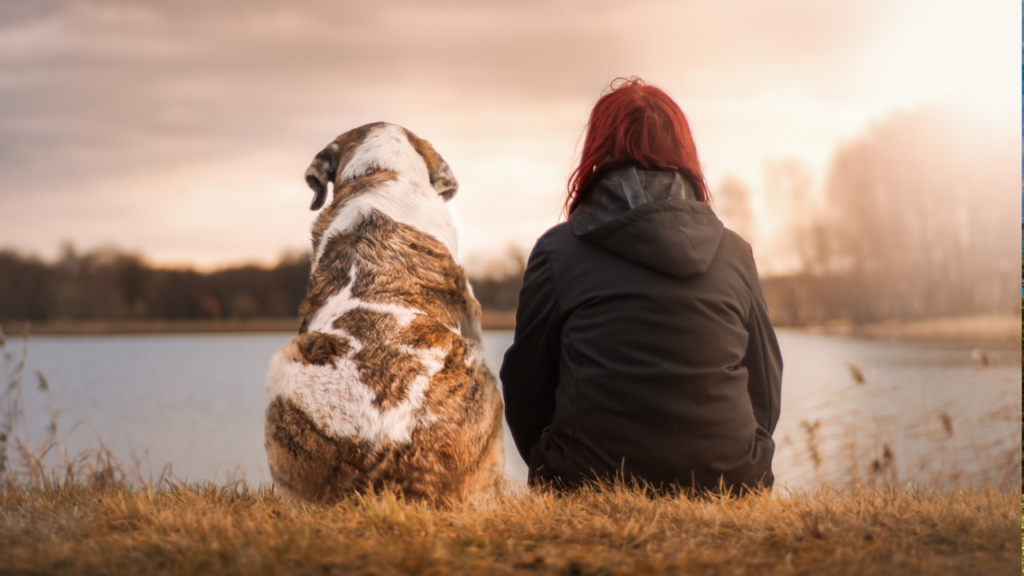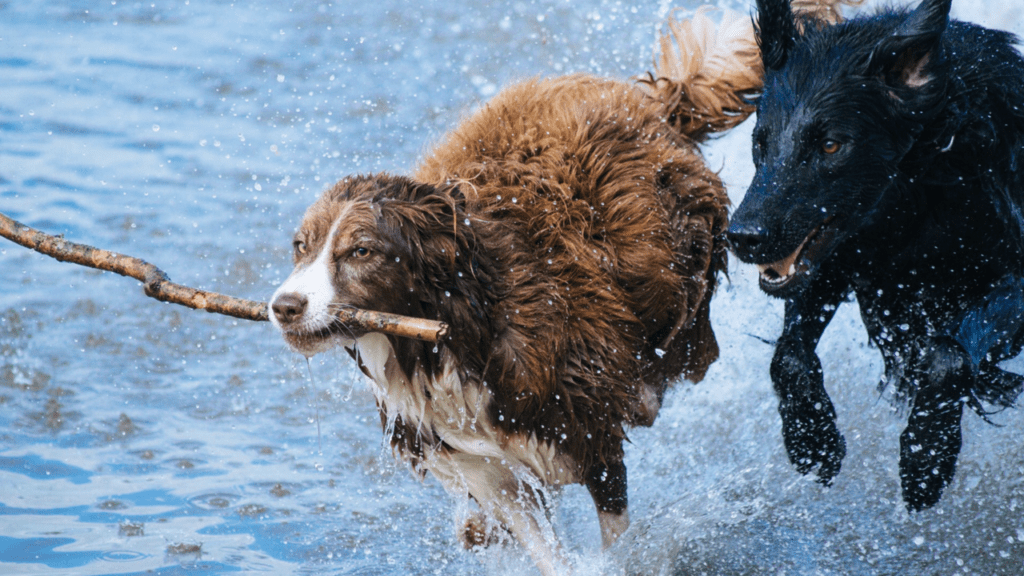The 8 Dog Training Concepts You Need To Teach Your Dog Right Now

If you’ve never heard of concept training before, it’s the biggest thing to hit dog training since the revolution that shifted traditional training methods from a punishment-based regimen to a reward-based philosophy. Whilst positive dog training is now more popular than it has ever been, there are still those who opt for an old-school approach. The forward-thinking among you, however, will be excited to learn that dog training has taken yet another leap forward: and we’ve called that leap ‘concept training’!
In a nutshell, the idea behind concept training is that instead of teaching a dog very specific commands and behaviours, we teach them broad dog training concepts, that will help to shape the dog’s personality, and enable them to choose the correct behaviours in any given situation by themselves.
Sound too good to be true? Check out just some of the dog training concepts at the core of this modern dog training approach below, and learn exactly how they can help transform your dog!
Want to learn a little more about concept training itself? Check out our article ‘What Is Concept Training?’ right here!
The 8 Dog Training Concepts Your Dog Needs to Know…
Confidence and Optimism:
It sounds great doesn’t it – who doesn’t want to be a little more confident and optimistic about life?
If you’ve ever owned a puppy, you’ll be really familiar with the idea of socialisation. The puppy class teacher will stress to you that your gorgeous little bundle of fluff only has a limited amount of time in which they will be generally open to new sights, sounds and experiences, and if you do not expose them to those sights, sounds and experiences, then they’ll potentially grow up to become worried by whatever it is you’ve failed to expose them to.
Think tumble dryers, vacuum cleaners, busy roads, children, bin men, men with beards, people with pushchairs… the list goes on. Pretty daunting, right? How can you possibly make sure you expose them to absolutely everything they might ever encounter in such a short amount of time? What if you forget something important? How will you fit it all in? More importantly, how will you ensure that every single exposure is a positive one, and you don’t end up programming IN those fears, instead of programming them out?
What if there was a better approach..?
How about teaching your dog the concept of optimism? What if, instead of teaching your dog, one by one, not to fear every single item/noise/person on the planet, you taught them that novelty is always rewarding? With concept training, this is exactly the approach we take. Through a series of games and exercises, we teach dogs and puppies that novelty is always something to be happy about.
How does this affect your dog’s behaviour long-term? You’ll raise a dog who doesn’t bark at lorries or wheelie bins, a dog who isn’t highly strung out on a walk, and a dog who does not spook easily at strange noises or new visitors. Behaviours that stem from fear and anxiety can be a real problem for owners – think barking, lunging, chewing, aggression… a dog who has been taught to truly embrace the concept of optimism and confidence has far less need to pull these behaviours out of the bag!
Proximity:
This one does exactly what it says on the tin: a dog who values proximity is a total joy to walk! Why? Because they just love to be by your side! Imagine a dog that doesn’t pull on the lead (why would they, when the most valuable spot to be is right next to you?) a dog that doesn’t disappear into the distance as soon as you take their lead off, a dog that doesn’t play ‘keep-away’ when it’s time for the lead to go back on, and a dog that always responds to a recall – sometimes before you’ve even called them back (yep, my eldest dog does this!)
Focus:
Again, another concept that speaks for itself in terms of value. A dog who has awesome focus is not going to be easily distracted by squirrels, cats or other dogs at the park. They’re unlikely to require a great deal of nagging to perform any given cue, no matter how distracting the environment, because they have massive value for paying you all the attention in the world when you need them to! So many dog owners will wax lyrical about all the awesome tricks their dogs can do at home, whilst they fail to perform a single one of them at the vet’s office, or the park. Through a series of games and exercises (that are FUN!) we can teach your dog that focus is the quickest route to the good stuff!
Arousal Up Arousal Down:
Arousal is a really interesting one in dog training, and can often be overlooked. It’s a big topic in its own right which we’ll address in detail in another article, but for now it’s enough to know that whilst increasing a dog’s arousal will improve their focus and their performance up to a point (which is why you’ll often see flyball dogs and agility dogs being worked up with play and vocal encouragement before a run!) there is in fact a critical peak where, once over-arousal is reached, their performance will absolutely drop off a cliff! And this is where some serious problem behaviours can arise.
Arousal levels are increased by different things in different dogs; for some dogs it may be new people that send them into a spin (this is why your impeccably trained obedience dog may turn into a maniac when the doorbell rings, and become deaf to every command you’ve previously proofed!) for others it may be the presence of other dogs, the sight of a squirrel, or something as simple as a game of tug.
When arousal levels are raised to this point, focus and performance will plummet, and your dog’s emotions will become intensely heightened, whether they are positive or negative. A calm dog will become excited, and an anxious dog will become fearful – which is why teaching your dog how to manage their arousal is critical to keeping them safe and healthy. Through play, training the concept of arousal up arousal down enables you to teach your dog how to quickly recover from high arousal so that they are never stuck in a prolonged state of fear or over-excitement. It makes arousal levels easily manageable, so that if you need to heighten your dog’s arousal for an agility run, you are free to do so, knowing that you can safely bring him back down afterwards, quickly and easily, enabling him to rest between runs.
Boundaries:
This is a fantastic concept to teach your dog right from the beginning – a dog who values boundaries is a dog who will choose to stay in their bed over hassling house guests, knocking over the kids, or begging under the dinner table. But that’s not all – teach the concept of boundaries rather than a ‘bed’ cue, and your dog will learn not just to value their own bed that they know and love, but they’ll be able to treat anything as a boundary – whether that’s a strange crate at agility class, a bench at the park, or even an impromptu shadow on your front lawn. Grow the value of boundaries through the power of dog training concepts, and your dog will stay put wherever and whenever you need them too… and they’ll be more than happy to do it, too!
Tolerance of Frustration:
Intolerance is something that can cause real problems in the canine world. A dog who lacks tolerance of frustration may give up on things like frozen Kongs or puzzle toys, which makes life difficult for owners trying to find long-lasting forms of entertainment for their dog when they have to leave them to go to work. Dogs who struggle with frustration can also have a hard time when it comes to training and learning new cues/exercises, because they become easily frustrated when they fail. With concept training, we work to build this tolerance, so that dogs can better cope with challenging situations, and persevere through challenge or failure, to reach success! A dog who tolerates frustration will not bark to be let out of the car, or scratch at the baby gate when they’re shut away – not only are they easier to live with -but they’re happier in themselves too!
Flexibility:
You may have heard before that dogs thrive on routine, and that providing them with structure is the best way to keep them happy and content. Well…. that’s one way of looking at it. But the truth of the matter is actually this: dogs are absolute masters of prediction, and if you feed them, walk them, play with them and train them at set times, in set locations and in set ways every day, they will come to predict and expect those events on a daily basis. This is fine… until something interrupts the recognised routine!
A dog raised on routine will not allow you to sleep in when you are feeling ill if their breakfast is always delivered at 7am, or they are always walked before 8am. Dogs with strict routines really struggle whenever a spanner is thrown in the works – these are the dogs who cry for their dinner if it is late, scratch at the door if their daily walk is delayed, and refuse to settle of an evening if they haven’t been granted their daily game of evening fetch or tug.
Dogs whose owners ditch the routine, however, actually develop a far more laid back approach to life! In concept training, we call this flexibility, and it has a massive effect on your day-to-day living. Imagine never being hassled for a walk, a game or to deliver your dog’s dinner? Imagine a dog who spent their entire day in a calm relaxed state, because they weren’t caught up in predicting what was going to happen next, or frustrated because their routine had been affected by something new?
Impulse Control:
Wouldn’t we all do better if we had a little more impulse control? Fewer unnecessary purchases, less junk food… the list goes on! It can be really tricky to restrain ourselves from buying, or eating, or doing the things we love… And the same goes for your dog. A dog who struggles with impulse control is a dog who will fly off across the park at the first sight of a squirrel, leap up and steal food from the kitchen counter at the first available opportunity, or run out of the front door in search of adventure as soon as it’s opened.
But imagine a dog who sees more value in resisting the things that tempt them… because they know the reward for doing so will be far greater than the reward they can gain for themselves by giving in to that impulse. A dog who sees the cat, or the squirrel, or the free food on offer, and instead turns towards you. How awesome would that be? And it’s totally achievable with concept training.
Gone are the days of sit-stay-yawn dog training classes… teaching your dog through the power of dog training concepts is an innovative, fun, and all-encompassing approach to training a well-mannered, well-behaved and happy dog. And it’s awesome fun for dog-owners, too!
Need more help with your dog training? Check out our printable planning resources right here, and follow us on Instagram and Facebook for daily tips!












